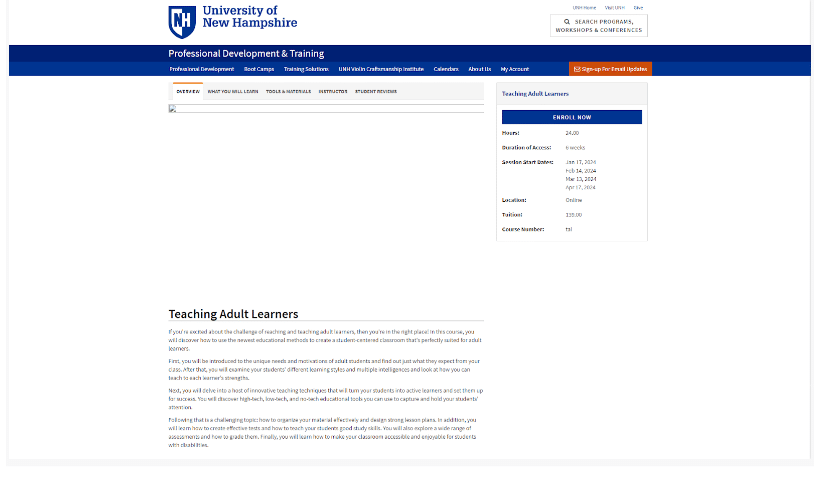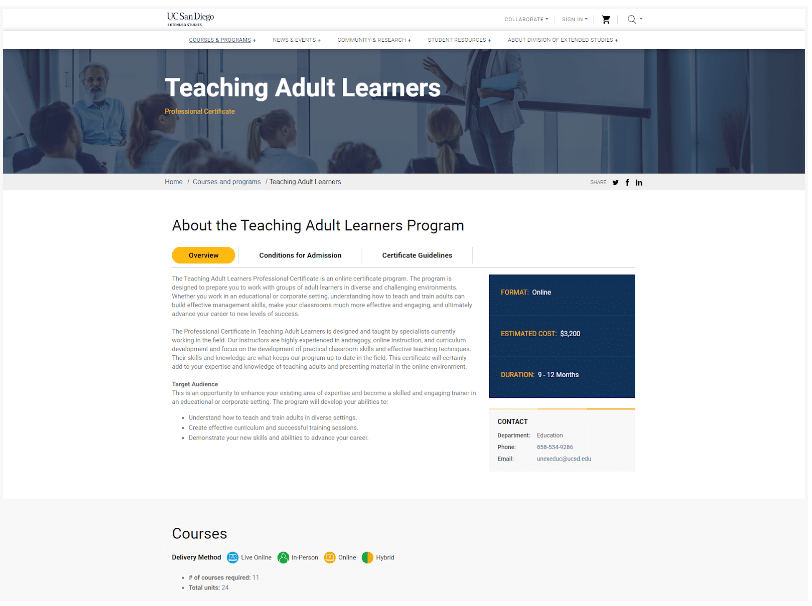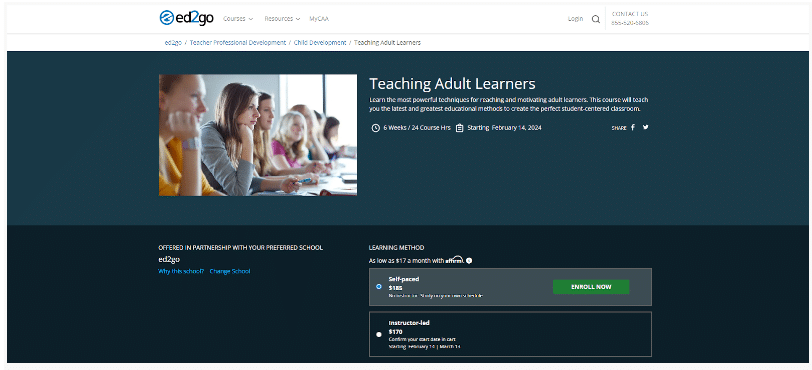The “Teaching Adult Learners” course equips educators with the necessary skills for effective adult education in various settings, receiving high praise.
It aims to provide a deep understanding of adult learning environments through four main modules covering instructional strategies, engagement, technology use, and instructional design.
These courses offer insights into creating dynamic and inclusive learning experiences for adult learners.
Therefore, let’s get into the details to know more!
Overview: Teaching Adult Learners
This course is designed to equip educators, trainers, and anyone interested in teaching with the skills and strategies necessary to effectively instruct adult learners. Ideal for those looking to enhance their teaching methods or transition into adult education, this course covers the principles of adult learning, instructional design, and techniques for engaging and motivating adult students. Through clear explanations and practical examples, participants will learn how to create an inclusive and effective learning environment for adults.
Course Syllabus Preview:
Our course syllabus is carefully structured to ensure a comprehensive understanding of teaching adult learners, making it accessible and actionable for all participants. Here’s an overview of the major topics and their subtopics:
I. Understanding Adult Learners
- Principles of Adult Learning
- Differences Between Adult and Young Learners
- Assessing Adult Learning Needs
II. Designing Learning for Adults
- Instructional Design Principles for Adults
- Developing Relevant and Practical Content
- Creating Inclusive Learning Materials
III. Strategies for Teaching Adults
- Engaging and Motivating Adult Learners
- Techniques for Active Learning
- Facilitating Discussions and Group Work
IV. Assessment and Feedback
- Effective Assessment Strategies for Adults
- Providing Constructive Feedback
- Using Assessments to Enhance Learning
V. Technology in Adult Learning
- Integrating Technology into Adult Learning
- Online Learning Platforms and Tools
- Overcoming Technology Barriers for Adults
VI. Overcoming Challenges in Adult Education
- Addressing Diverse Learning Styles and Needs
- Managing Classroom Dynamics
- Supporting Lifelong Learning and Development
VII. Professional Development for Adult Educators
- Continuing Education for Educators
- Building a Supportive Learning Community
- Reflective Practice and Self-Evaluation
What You Will Learn
By joining this course, participants will gain:
- Insights into Adult Learning: Understand the unique characteristics and needs of adult learners.
- Instructional Design Skills: Learn how to design and deliver content that is relevant, engaging, and practical for adults.
- Effective Teaching Strategies: Master techniques for facilitating learning, encouraging participation, and motivating adult students.
- Assessment and Feedback Methods: Develop strategies for assessing adult learning and providing feedback that promotes growth and improvement.
- Technology Integration: Explore ways to incorporate technology into adult education to enhance learning experiences.
Student Feedback And Course Rating
The course has received an overall rating of 89% from 1,228 student reviews.
Each aspect of the course—its interest level, challenge, effectiveness in achieving learning objectives, and clarity of expectations—has been rated 3.5 out of 5.
This feedback underscores the course’s balanced approach to being engaging, challenging, and informative.
Course Goals and Content
The primary aim of the “Teaching Adult Learners” course is to provide educators with a foundational understanding of how to create a supportive and accountable learning environment for adult students.
The course content is carefully structured into four key modules, each focusing on different aspects of adult education:
1. Instructional Tactics: This module delves into various instructional strategies and tactics that foster a safe and accountable learning environment, ensuring that adult learners can study effectively and without barriers.
2. Engaging Adult Learners: It emphasizes the importance of collaborative learning and how to engage adult learners actively in the educational process.
3. Engaging Learners Through Technology: This part explores the integration of technology in education and how it can be leveraged to enhance learner engagement and participation.
4. Key Components of Instructional Design: The final module covers the essential elements of instructional design, offering insights into creating effective and impactful learning experiences for adults.
Top 10 Strategies for Teaching Adult Learners
Teaching adults? Here’s your cheat sheet featuring the top 10 Strategies for teaching adult learners:
- Make it real: Connect lessons to their lives.
- Storytime! Use tales to explain things.
- Bite-sized info: Avoid overwhelming them.
- Get them involved: Keep them active and participating.
- Hook them in. Make lessons interesting and engaging.
- Tap into their experience: Build on what they already know.
- Everyone learns differently: Cater to various learning styles.
- Show, don’t just tell: Use visuals to keep things engaging.
- Let them explore: Give them opportunities to learn on their own.
- Ask questions and encourage discussion: Let them talk and learn from each other.
- Feedback is key: Help them improve.
Top 3 alternative courses on Teaching Adult learners
Here are popular alternative courses on Teaching Adult Learners that the institutes are currently offering:
1. University Of New Hampshire (UNH) – Teaching Adult Learners
| Course Link | Here |
| Pricing | $139 |
The UNH course is designed to equip educators with the skills to create a student-centered classroom tailored for adult learners. It covers adult students’ unique needs and motivations, emphasizing the importance of understanding different learning styles and intelligences.

To engage students actively, the course is structured around innovative teaching techniques, including high-tech, low-tech, and no-tech educational tools.
Key Modules and Topics:
- Keys to Success in Your Teaching Career: Enhancing professionalism and managing time effectively.
- Creating a Positive Learning Environment: Understanding adult learners’ expectations and preparing for the first day.
- Understanding Learning Styles: Adapting to various intelligences and learning preferences.
- Managing, Supervising, and Counseling Students: Techniques for addressing classroom challenges.
- Basic Teaching Methods: Innovative strategies for a dynamic learning experience.
- Planning Your Course: Effective organization and lesson planning.
- Educational Aids and Classroom Technology: Utilizing diverse aids to enhance learning.
- Creating Effective Presentations: Engaging students through motivational techniques.
- Grading and Advising: Developing assessments and understanding grading strategies.
- Teaching Students with Special Needs: Making classrooms accessible for all.
- Teaching Study Skills and Test-Taking Techniques: Enhancing students’ academic success.
- Starting a Career as an Adult Educator: Tips for job search and career advancement.
2. University of California San Diego (UCSD) Extension – Teaching Adult Learners Professional Certificate
| Course Link | Here |
| Pricing | $3200 |
UCSD’s program prepares educators to work with adult learners in various settings, focusing on creating effective curricula and training sessions. It is designed and taught by specialists in andragogy, online instruction, and curriculum development.

Key Modules and Topics:
- Introduction to Online Learning: Overview of distance learning, learning theories, and online education.
- Foundations of Curriculum Design and Evaluation: Instructional Systems Design Model and curriculum development.
- Foundations of Adult Education: Strategies for engaging adult learners.
- Interpersonal Relations, Communication Skills, and Guidance: Addressing the diversity of adult learners.
- Teaching and Training Adults in Diverse Settings: Differentiation of teaching and training methods.
- Effective Strategies for Teaching and Training Adults: Research-based strategies for adult learning.
- Instructional Practices: Developing relevant and effective adult-oriented educational programs.
- Current Issues in Adult Education: Exploring issues impacting adult education.
- Preparing for a Community College Career: Teaching, counseling, and administrative opportunities.
- Instructional Technology Tools: Learning management systems and best practices.
- Adult Learners Capstone Portfolio: Compilation of program highlights and personal review.
3. ed2go – Teaching Adult Learners
| Course Link | Here |
| Pricing | $185 |
ed2go’s course focuses on the latest educational methods to create a student-centered classroom ideal for adult learners. It introduces participants to the unique needs and motivations of adult students, exploring different learning styles and multiple intelligences.

The course emphasizes innovative teaching techniques and the use of educational tools to maintain student engagement.
Key Modules and Topics:
- Keys to Success in Your Teaching Career: Building confidence and establishing authority.
- Creating a Positive Learning Environment: Meeting the needs of adult learners.
- Understanding Learning Styles: Tailoring teaching to various learner strengths.
- Managing, Supervising, and Counseling Students: Addressing classroom behavior and performance issues.
- Basic Teaching Methods: Engaging students through active learning strategies.
- Planning Your Course: Effective lesson planning and material organization.
- Educational Aids and Classroom Technology: Enhancing presentations with various aids.
- Creating Effective Presentations: Motivating students and creating impactful presentations.
- Grading and Advising: Assessment strategies and grading practices.
- Teaching Students with Special Needs: Accessibility and inclusivity in the classroom.
- Teaching Study Skills and Test-Taking Techniques: Improving students’ academic skills.
- Starting a Career as an Adult Educator: Career advancement tips for educators.
Unique Teaching Methodologies and Tools
Across these courses, a range of teaching methodologies and tools are employed to address the diverse needs of adult learners. These include:
- Student-Centered Learning: All three courses emphasize creating a learning environment that prioritizes the needs, experiences, and motivations of adult learners.
- Active Learning Techniques: Techniques such as role-playing, mnemonics, and visualization are highlighted to engage students actively in their learning process.
- Technology Integration: The use of high-tech, low-tech, and no-tech tools is a common theme, showcasing the importance of technology in enhancing the learning experience.
- Diverse Assessment Strategies: The courses cover a wide range of assessments and grading strategies, acknowledging the varied ways adult learners demonstrate their understanding.
Conclusion
Teaching adults is a unique and valuable experience. It challenges us to adapt our approach, consider diverse perspectives, and, ultimately, witness the transformative power of lifelong learning.
Remember, every learner is on their own journey – embrace the process, be open to feedback, and together, you’ll create a truly enriching learning experience.
Article By

